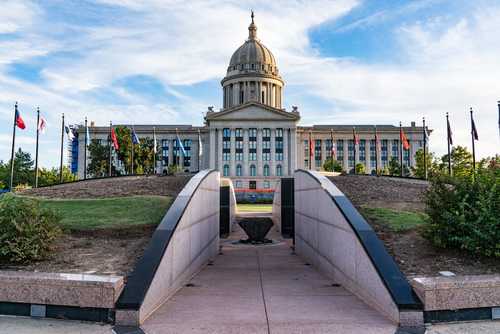OKLAHOMA CITY, Okla. – In a special session The Oklahoma State Legislature voted to override Governor Kevin Stitt’s vetoes over tribal compacts, SB 26X and HB 1005X on July 31.
Overrides on both bills, SB 26X and HB 1005X were both overwhelmingly approved by their respective legislative bodies. SB 26X received 72 yeas, and 16 nays. HB 1005X received 74 yeas, and 11 nays. SB 26X is an extension of state-tribal tobacco compacts, HB 1005X is an extension of existing single motor vehicle license registration.
During a press conference after the special session, Governor Stitt responded to the overrides with a lawsuit against Senate Pro Tem Greg Treat and House Speaker Charles McCall. In the lawsuit he is calling for the Oklahoma Supreme Court to void the compact extensions approved and overridden by the legislatures.
Governor Stitt claims the tobacco compacts on the table this year are financially identical to last year’s tobacco compact. According to him, the disagreement over his compact and the state legislature’s compact came down to language over what is defined as Indian Country.
“What does that mean for Oklahomans? That means that with this compact that the legislature just signed that the tribes were pushing is including turning eastern Oklahoma into a reservation. I am very very clear that I do not believe that Oklahoma wants eastern Oklahoma to be turned into a reservation,” Governor Stitt said. “I will fight as long as I’m Governor to make sure that we’re one state with one state with one set of rules, regardless of your race or where you live.”
Governor Stitt further criticized other cases involving Muscogee (Creek) Nation, including the Hooper v. Tulsa case and the Stroble v. Oklahoma Tax Commission case. He claims these cases are promoting racial preference toward Native Americans if they do not have to follow state laws.
Hooper v. Tulsa, a case that involves the City of Tulsa’s authority in issuing traffic tickets to tribal citizens on tribal land, was recently granted a stay until Aug 2. It is set to be presented before the U.S. Supreme Court. In that case a Choctaw citizen contested a traffic ticket, stating the City of Tulsa had no right to enforce the ticket since the crime was committed within the jurisdiction of Muscogee (Creek) Nation.
Stroble v. Oklahoma Tax Commission involves MCN Citizen Alicia Stroble, who claims in the suit that she is exempt from paying state taxes because she is a tribal citizen that lives on her tribe’s reservation. That case saw support from all Five Civilized Tribes of Oklahoma. The case is currently in the Oklahoma Supreme Court.
In the same press conference Governor Stitt also claimed that the state has lost $4.7 million in toll road revenue due to tribal citizens that drive vehicles with tribal license plates. He claimed the new PlatePay system can not read tribal license plate numbers.
Reaction to the Special Session
Oklahoma Senate Pro Tem Greg Treat responded to Stitt’s lawsuit in a statement. He expressed that he wants more clarity on legislation regarding tribal sovereignty, and that he is seeking to work with the tribes on compacts that will benefit all Oklahomans, tribal and non tribal. According to Senator Treat, the governor does not have the state’s best interest at hand.
“By overriding these vetoes, the legislature gave the governor another avenue and opportunity to negotiate in good faith, as we have done repeatedly. He has never accepted or appreciated our efforts and has turned his back all four million Oklahomans, the legislative process and Oklahoma’s tribal partners, costing the state millions in legal fees. This zero-sum game he is playing is a losing strategy and I hope Oklahomans and my fellow lawmakers are paying careful attention.” Senator Treat said.
Leadership from the tribes involved with the compacts expressed their reactions from the special session, including MCN Principal Chief Hill. In a social media post Chief Hill expressed his gratitude for the legislature’s actions.
“We applaud today’s vote to override the veto of SB 26X…The issues that our shared communities face can no longer wait to be addressed while we waste time and taxpayer money on pointless legal battles. The message should be clear now, it’s time to work together.” Chief Hill said.
The compact overrides’ void is currently in the Oklahoma Supreme Court.







Indian tribes have helped the state prosper with jobs hospital, monies given to rural communities , road repairs.spending monies the state and county doesn’t have to spend.education opportunity and job advantage.we are all Oklahoma’s . its time the governor quits trying to devide the state.we need to work together for all. instead of decisive and polarizing words and actions.maybe the governor is the problem.florida will take him back.